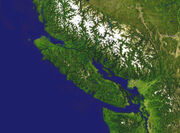
|
This Russian America Article is a Stub The creator of this timeline is seeking help in the development of this article. You have permission to expand it. Please familiarize yourself with the editorial guidelines before making any edits. |
| ||||||
| Capital | Victoria | |||||
| Largest City | Nanaimo | |||||
| Other Cities | Campbell River Courtenay Langford Parksville | |||||
| Language Official |
English and Russian | |||||
| Others | Chinese, German, Norwegian | |||||
| Religion Main |
Anglicans | |||||
| Others | Luthereans, Eastern Orthodox | |||||
| Ethnic Groups Main |
English and Scots | |||||
| Others | Han Chinese, Germans, Irish | |||||
| Demonym | Vancouver Islanders (en) Ванкуверцы (ru) | |||||
| Area | 30,318 sq vrs (34,504 km2 • 13,322 sq mi) | |||||
| Population | 2,094,479 | |||||
| Established | ~1945 | |||||
| Admission | ~1945 | |||||
| Time Zone | VAPV (UTC−08:00) | |||||
| Summer | VALV (UTC−07:00) | |||||
| Abbreviations | • AK-OV (ISO 3166-2) • АЛЯ-ВАН (GOST 7.67) • ГОВ (colloquial) • ОВ (colloquial) | |||||
The Governorate of Vancouver Island (Russian: Губерния Острова Ванкувера, romanized: Guberniya Ostrova Vankuvera), colloquially known as Vancouver Island (Остров Ванкувер, Ostrov Vankuver), is a governorate of the Alaskan Democratic Federative Republic. As an island, the governorate has no physical borders with the rest of Alaska (aside from being close to Columbia in the east). Victoria is the gubernial center while Nanaimo is the most populous city.
History[]
Throughout the late-1700s, the islands were under the nominal control of both the British and the Spanish. Under Spanish rule, the islands were called the Isla de Quadra y Vancouver ("Quadra's and Vancouver's Island"). By 1789, tensions in the area nearly caused a war. Spanish influence over the islands gradually declined by the early-19th century, which became solidified following their defeat in the Western War against the Russian Empire. Fearing a complete Russian takeover, the British would expand their colonial presence over the islands and establish a formal colony by 1849.

Satellite Image of Vancouver Island.
By the 1840s, Vancouver Island (along with the rest of British Columbia) would see an influx of American and British settlers, who's descendants are colloquially known as Dougs. The exact origin of the term is unknown but is believed to be a reference to the Douglas fir or to Governor James Douglas (who served as the only governor during British rule).
As part of the 1867 Columbia Sale, Vancouver Island (as well as the rest of British Columbia) became part of the Russian Empire. During the rule of Tsar Alexander II, the Russians would allow a degree of autonomy for the English settlers. These lighthanded policies ended in the 1880s following Alexander II's assasination. His successors (tsars Alexander II and Nicholas II) would push for the Russification of the former British colonies.
During the Alaskan Wars, the Doug-dominated areas would form a break-away nation called the Commonwealth of Columbia (with Victoria serving as their capital). The ultimate goal was either for the nation to join the United States or be reintegrated in the Commonwealth of Nations. The Commonwealth of Columbia would formally agree to rejoin Alaska in 1929 and admitted as the Columbia Governorate. In 1945, Vancouver Island itself was split off to become their own governorate. During the late-1950s and early-1960s, Vancouver Island would see a new rise of Doug nationalism. Senator for Vancouver Island, Barry Goldwater, would establish the right-wing Party of Dougs and Tories during this time and would continue to lead the party until he died in 1998.
Demographics[]

Skyline of Victoria.
As with Columbia and the Queen Charlotte Islands, Vancouver Island recognizes both English and Russian as gubernial languages (with high levels of bilingualism). Those of Anglo-American descent (colloquially known as Dougs) make up the vast majority of the governorate's population. Germans, Russians, Scots, and Ukrainians are also prominent. The governorate has the highest concentration of Anglicans and Protestants in Alaska. Vancouver Island has been politically dominated by The Evergreens and the Party of Dougs and Tories.
| |||||||||||||||||||||||



